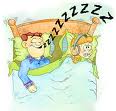If you're a snorer in your household, you're probably getting a lot more sleep than anyone who can hear you. Try the following preventative measures.
5 Steps ::
- Avoid the things that make snoring worse: alcohol, sleeping pills, coffee and rich foods before bedtime.[1] If you regularly take any kind of medication, talk to your doctor about alternatives. Some drugs can make snoring worse, including sleeping pills and sedatives.
- If you sleep on your back, buy yourself a few extra pillows and prop yourself up in bed, rather than lying flat on your back. Also, raise the head of your bed. An easy way to do it is to place several flat boards under the legs at the top end of the bed. A couple of old phone books under each leg should also raise the bed enough to do the trick.
- Sleep on your side. There's a good reason you don't want to sleep on your back: in that position, your tongue and soft palate rest against the back of your throat, blocking the airway. One way people train themselves to stay on their side is by taping or sewing a tennis ball to the back of their shirt, so whenever you roll onto your back, it's very uncomfortable.
- Try mouthpiece devices -- also known as dental appliances, or mandibular advancement splints. They are usually small plastic devices worn in the mouth during sleep to prevent the soft throat tissues from collapsing and obstructing the airway. They do this by bringing your lower jaw forward and/or by lifting your soft palate. Some devices also stop the tongue from falling back over your windpipe.
- Address any nasal congestion.
- Try taking a decongestant or antihistamine if nasal congestion is causing your snoring. Use these only as a temporary measure if you suspect that a cold or allergy is to blame. Prolonged use of either can be harmful.
- Gargle with a peppermint mouthwash to shrink the lining of your nose and throat. This is especially effective if your snoring is a temporary condition caused by a head cold or an allergy. To mix up the herbal gargle, add 1 drop of peppermint oil to a glass of cold water. (Only gargle - do not swallow.)
- Change your sheets and pillowcases often to relieve nasal stuffiness, alleviate bedroom allergens. Try to vacuum your floors and curtains often too.
- Tape your nose open with nasal strips, available at most pharmacies. They may look odd, but who's looking? Following the directions on the package, tape one of the strips to the outside of your nose before you fall asleep. They work by lifting and opening your nostrils to increase airflow.
- Try taking a decongestant or antihistamine if nasal congestion is causing your snoring. Use these only as a temporary measure if you suspect that a cold or allergy is to blame. Prolonged use of either can be harmful.
Free Tips ::
- Lose Weight. Weight loss can reduce your snoring by easing any constriction of the upper airway.
- Recommended 3 minute exercises, i performed -- when i used to snore Free Tips.

No comments:
Post a Comment